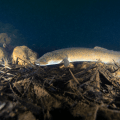Table of Contents
Freshwater eels are the most familiar of eel, and they comprise of around 16 species. They have a pretty unusual characteristic scientifically known as catadromy; in which they live most of their lives in freshwater, but goes to saltwater to spawn.
Though they can’t see well in murky waters, they have an incredible sense of smell. Their elongated body varies in color and size; and they breathe by opening their mouth to allow water to pass through their gills. They can make any aquarium look lovely with their presence as pet; especially with their long dorsal fin that runs in the middle of their back, but they’re recommended only for experienced aquarists.
Freshwater Eels Facts
The average lifespan of a freshwater eel actually depends on the specie. American eel for example, can live for around 10 to 25 years in the wild; before migrating back to sea to complete their lifecycle.
The average size of an adult freshwater eel is around 1 to 3 feet, while some can grow longer.
They can be aggressive at times and may eat smaller tankmates.
As aquarium pets, freshwater eel will need a minimum aquarium size of 20 gallons; depending on the species and their number. Plus, the water temperature must be kept between 72° F to 82° F.
Freshwater Eels Diet
Freshwater eels are carnivorous, and most types are nocturnal, which means they feed at night. Their diet however, is pretty diverse, and they’re very adaptable to their environment.
As aquarium pets, freshwater eels must have a well-balanced diet; which consists of frozen and/or dried food, live and pelleted food.
Feeding Freshwater Eels
These animals must be fed once a day, usually at night, since they are nocturnal animals. Some eels may refuse to eat, and eat only ever a couple of weeks.
Freshwater Eels Housing
For their housing, freshwater Eel’s aquarium lid must always be well-sealed; as they can easily wiggle its way on the surface and escape. Inside the aquarium must be plenty of room to swim and hide. They love to hide in caves and holes.
There should never be any copper-based medications as they can be toxic for eels.
Water quality must be kept stable, as it’s critical for eel’s health. If you don’t the specifics of water quality for your eel; then check it with your nearest pet store; or research online, as there are plenty of information you can find.
It is important to check filter, water temperature and other aquarium equipment daily. Water quality must be checked once a week, and every month; owners need to change the to 10 to 25% of the water volume, or as needed.
Thus, they should not be housed with smaller and slow-swimming species; as they can be stressed and aggressive in an overcrowded environment.
Health Watch
Also, as a freshwater eel owner, you should keep an eye of your pet’s health. Some signs of a healthy eel are clear eyes, even coloring and healthy appetite.
Some of the red flags are cloudy eyes, difficulty in breathing, erratic swimming, loss of appetite; and fungus or spots on mouth or body.
Should you notice white spots on their body and fits and rapid respirations; then you should quarantine the eel as soon as possible. Use a commercial ich remedy for a couple of weeks to treat your pet.
Care Tips
As with other aquatic life, freshwater eels can be carriers of infectious diseases, like Salmonella and Atypical Mycobacterium. Thus, it is important that you wash your hands before and handling the eel; or anything inside its aquarium to prevent any risk of disease spreading.






 Author and long-time animal lover. Sharing knowledge on pet care through experience and the written word.
Author and long-time animal lover. Sharing knowledge on pet care through experience and the written word.